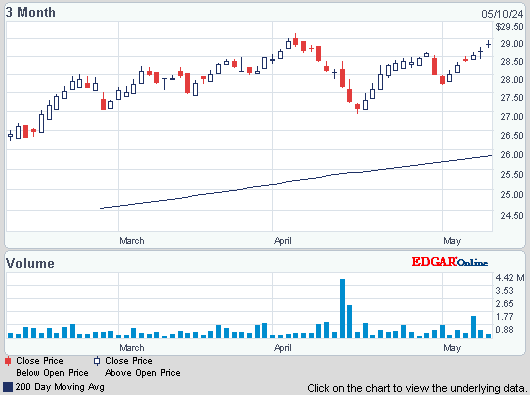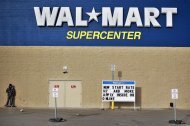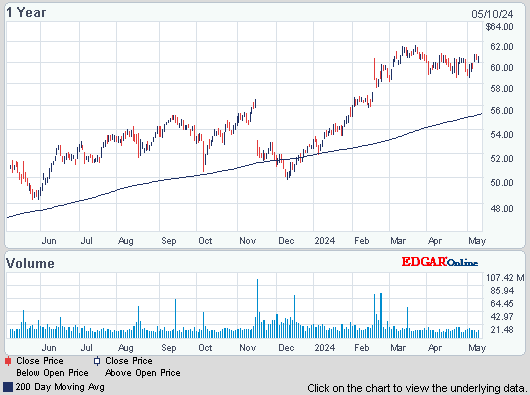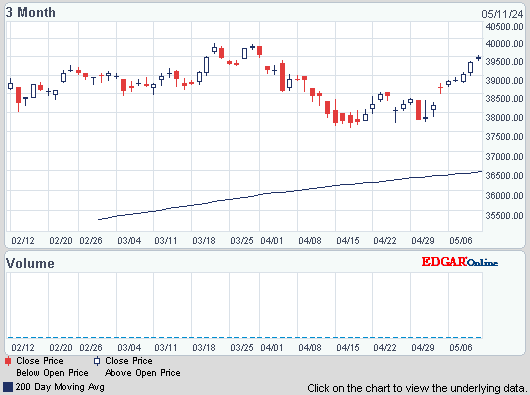Dow dropped 11, declines over advancers 5-4 & NAZ was up 3. The MLP index slid a fraction to 460 & the REIT index was also off a fraction, to 312. Junk bond funds were mixed but oversold Treasuries are having a strong rally. Oil was flattish & gold sank further below $1400.
AMJ (Alerian MLP Index tracking fund)


Photo: Bloomberg
Ground-breaking for new US homes plummeted more than expected in Apr from an almost 5-year high, but applications to build new homes shows the housing sector could still contribute to the strengthening economic recovery. The Commerce Dept said that starts at building sites for homes fell 16.5% last month to a 853K unit annual rate, far below expectations of a 945K unit rate. Building applications that are higher than the level of starts signal residential construction will rebound as near record-low mortgage rates & improving job opportunities draw buyers. A limited supply of land is a hurdle for housing even as recent strength in real estate extends beyond builders to boost lenders & suppliers of construction materials.
Housing Starts in U.S. Fell in April to Five-Month Low

Photo: Yahoo
The number seeking unemployment benefits rose 32K last week to 360K, the most since late Mar. The jump came a week after applications had reached a 5-year low. The less volatile 4-week average rose just 1K to 339K according to, the Labor Dept. Weekly applications are a proxy for layoffs & the big increase might mean companies are cutting more jobs, possibly because of steep gov spending cuts that kicked in Mar 1. The 4 week average remains 9% lower than it was 6 months ago. The number receiving benefits fell 30K to 4.8M, down from 6.3M a year ago. Some have probably gotten jobs, but many have simply used up all their available benefits.
Jobless Claims in U.S. Jump to Highest Level in Six Weeks

Photo: Yahoo
Wal-Mart, a Dow stock & Dividend Aristocrat, said that this qtr would be challenging & gave a forecast that suggests profit will again miss expectations, due in part to costs from its foreign bribery probe. Earnings were just below estimates, & revenue came in lower than expected. Everything from tax pressures on shoppers to a cool start to spring led to an unexpected drop in sales at US stores open at least a year. The company forecast EPS of $1.22-$1.27 for its Q2 which began May 1. Analysts had been expecting $1.29 & the year-earlier profit was $1.18. In the first qtr, same-store sales for US stores, by far the largest unit, fell 1.4%. Both WMT & analysts had expected such sales to be about flat with those of a year earlier. CEO Bill Simon said a delay in income tax refund checks, a 2% increase in payroll taxes & "some of the most unfavorable spring weather we've seen in recent years across much of the country" hurt business. Visits to US stores open at least a year fell 1.8%, while the average amount spent per trip rose 0.4%. Sales of warm-weather items, from outdoor furniture & sporting goods to fans & spring clothes, were challenged, particularly from mid-Mar to mid-Apr, Simon said. At the same time, price increases in grocery items were lower than expected, "and in fact, we had some deflation in areas like dry grocery," he said. The analyst forecast for EPS was $1.15. In Feb, WMT had forecast EPS of $1.11-$1.16. Q1 revenue rose 1% $114.2B & analysts expected $116.3B. The company expects Q2 same-store sales, excluding those of fuel, to be flat to up 2% in the US & up 1-3% Sam's Club warehouse store chain. The stock sank 1.72.

Stocks are taking dreary economic news fairly well, with only limited selling. But there are no shortage of problems being ignored. The pres is under fire on a lot of fronts, making it difficult for him to get anything done. The IRS fiasco could have major economic implications because these are the guys who are supposed to enforce the Obamacare regulations. That's going to be a lot tougher. The earnings report from WMT is another major downer. It is sending strong signals that all is not well in the US economy with an unfavorable trend. But the Dow could care less.
Dow Jones Industrials

AMJ (Alerian MLP Index tracking fund)
Treasury yields:
U.S. 3-month |
0.03% | |
U.S. 2-year |
0.23% | |
U.S. 10-year |
1.87% |
| CLM13.NYM | ....Crude Oil Jun 13.... | 94.57 | (0.3%) |
| GCK13.CMX | ....Gold May 13 | .....1,373.30 | (1.7%) |

Photo: Bloomberg
Ground-breaking for new US homes plummeted more than expected in Apr from an almost 5-year high, but applications to build new homes shows the housing sector could still contribute to the strengthening economic recovery. The Commerce Dept said that starts at building sites for homes fell 16.5% last month to a 853K unit annual rate, far below expectations of a 945K unit rate. Building applications that are higher than the level of starts signal residential construction will rebound as near record-low mortgage rates & improving job opportunities draw buyers. A limited supply of land is a hurdle for housing even as recent strength in real estate extends beyond builders to boost lenders & suppliers of construction materials.
Housing Starts in U.S. Fell in April to Five-Month Low

Photo: Yahoo
The number seeking unemployment benefits rose 32K last week to 360K, the most since late Mar. The jump came a week after applications had reached a 5-year low. The less volatile 4-week average rose just 1K to 339K according to, the Labor Dept. Weekly applications are a proxy for layoffs & the big increase might mean companies are cutting more jobs, possibly because of steep gov spending cuts that kicked in Mar 1. The 4 week average remains 9% lower than it was 6 months ago. The number receiving benefits fell 30K to 4.8M, down from 6.3M a year ago. Some have probably gotten jobs, but many have simply used up all their available benefits.
Jobless Claims in U.S. Jump to Highest Level in Six Weeks

Photo: Yahoo
Wal-Mart, a Dow stock & Dividend Aristocrat, said that this qtr would be challenging & gave a forecast that suggests profit will again miss expectations, due in part to costs from its foreign bribery probe. Earnings were just below estimates, & revenue came in lower than expected. Everything from tax pressures on shoppers to a cool start to spring led to an unexpected drop in sales at US stores open at least a year. The company forecast EPS of $1.22-$1.27 for its Q2 which began May 1. Analysts had been expecting $1.29 & the year-earlier profit was $1.18. In the first qtr, same-store sales for US stores, by far the largest unit, fell 1.4%. Both WMT & analysts had expected such sales to be about flat with those of a year earlier. CEO Bill Simon said a delay in income tax refund checks, a 2% increase in payroll taxes & "some of the most unfavorable spring weather we've seen in recent years across much of the country" hurt business. Visits to US stores open at least a year fell 1.8%, while the average amount spent per trip rose 0.4%. Sales of warm-weather items, from outdoor furniture & sporting goods to fans & spring clothes, were challenged, particularly from mid-Mar to mid-Apr, Simon said. At the same time, price increases in grocery items were lower than expected, "and in fact, we had some deflation in areas like dry grocery," he said. The analyst forecast for EPS was $1.15. In Feb, WMT had forecast EPS of $1.11-$1.16. Q1 revenue rose 1% $114.2B & analysts expected $116.3B. The company expects Q2 same-store sales, excluding those of fuel, to be flat to up 2% in the US & up 1-3% Sam's Club warehouse store chain. The stock sank 1.72.
Wal-Mart (WMT)
Stocks are taking dreary economic news fairly well, with only limited selling. But there are no shortage of problems being ignored. The pres is under fire on a lot of fronts, making it difficult for him to get anything done. The IRS fiasco could have major economic implications because these are the guys who are supposed to enforce the Obamacare regulations. That's going to be a lot tougher. The earnings report from WMT is another major downer. It is sending strong signals that all is not well in the US economy with an unfavorable trend. But the Dow could care less.
Dow Jones Industrials










No comments:
Post a Comment